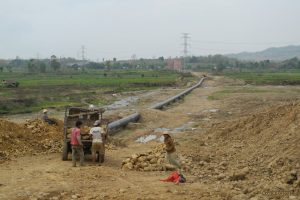Yesterday, The Irrawaddy published a report claiming that a Chinese oil and gas pipeline facility in central Myanmar had been damaged in an attack by a civilian militia opposed to the country’s military junta. According to the article, at around 2 a.m. on February 14, a local anti-junta People’s Defense Force (PDF) used two rifle grenades to attack Myanmar military soldiers guarding a pipeline off-take station in Mandalay Region’s Natogyi township. In the attack, the wall of the off-take station was damaged after being hit by an explosive.
While the damage was relatively minor, the attack carries potentially important geopolitical implications. The two Chinese-built pipelines, which pump oil and gas for hundreds of kilometers from the coast of Myanmar’s Rakhine State into southwest China’s Yunnan province, are part of the Chinese government’s long-standing goal of creating an overland corridor to the Indian Ocean, in part to reduce its heavy reliance on energy imports shipped through the congested Straits of Malacca.
Since last February’s coup, however, the Chinese pipelines have been vulnerable to the wrath of a Myanmar population that has been harshly critical of China’s policy of grudging but pragmatic engagement with the military junta.
Never popular in Myanmar to begin with, the Chinese government has over the past year been widely attacked for supporting the coup, and prioritizing its own strategic interests over the wellbeing of the Myanmar people.
While there are good reasons to think that Beijing was unhappy with the coup that overthrew the National League for Democracy (NLD) government, with which it had cultivated good relations during its previous five years in power, the extent of the collapse in trust was captured in the ISEAS-Yusof Ishak Institute’s most recent survey of Southeast Asian policy, media, and business elites.
In the State of Southeast Asia 2022 survey report, released yesterday, the proportion of Myanmar-based respondents expressing “no confidence” in China to “‘do the right thing’ to contribute to global peace, security, prosperity, and governance” jumped from 26.3 percent in 2021 to an astonishing 77.1 percent this year. A further 87.3 percent said they were “worried” about China’s growing regional economic influence, up from 76.9 percent last year. While these surveys reflect the state of elite opinion, there is no reason to believe that the views of the public are any different. Indeed, they could potentially be more negative still.
All this has made it possible that Chinese interests could be attacked as effective proxies of the military junta. Last March, during large-scale demonstrations in Yangon’s industrial suburbs, several Chinese-run factories were smashed and set on fire, and some protesters even suggested that the Chinese government’s supposed support for the coup was inviting sabotage and attacks on the oil and gas pipelines.
Even if not targeted directly, the Chinese government has requested that the military regime to protect its key infrastructure projects, meaning that Chinese facilities run the risk of becoming collateral damage in the increasingly heated fight between the PDFs and the Tatmadaw.
This was the case in Monday’s attack in Mandalay Region, and also in an earlier attack on January 7, when a civilian militia group blew up three electricity pylons supplying power to the China-backed Tagaung Taung nickel processing plant in Sagaing Region, forcing the plant to halt production.
Interestingly, in both cases the attackers have made clear that they were not attacking the Chinese facilities, but rather the regime that is defending them. Regarding this week’s attack, a leader of the Natogyi-People’s Defense Force told The Irrawaddy, “We just targeted the regime forces, not the pipeline station.” Similarly, in an interview with the same publication last month, Yee Mon, the defense minister of the opposition National Unity Government (NUG), which is spearheading the fight against the military dictatorship, said, “We don’t have a policy to attack the investments of neighboring countries.”
All this no doubt reflects the concerns of the NUG and its allies that while public anger toward China is burning white-hot, directly targeting Chinese interests would be counterproductive, and achieve little except to lead Beijing to more directly throw its weight behind the military junta.
It also reflects the fact that the ousted NLD government, whose denizens fill the ranks of the NUG, had established workable and friendly relations with Beijing during its five years in office. Despite the NUG’s anger at Beijing’s support for the military junta, should it return to power, the shadow government would immediately confront the challenge that has faced all of the governments, military and civilian, that have governed Myanmar: the need to find a way to live with the country’s giant northern neighbor.

































